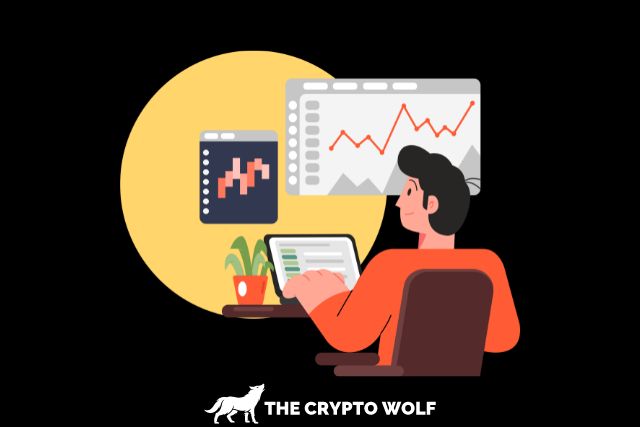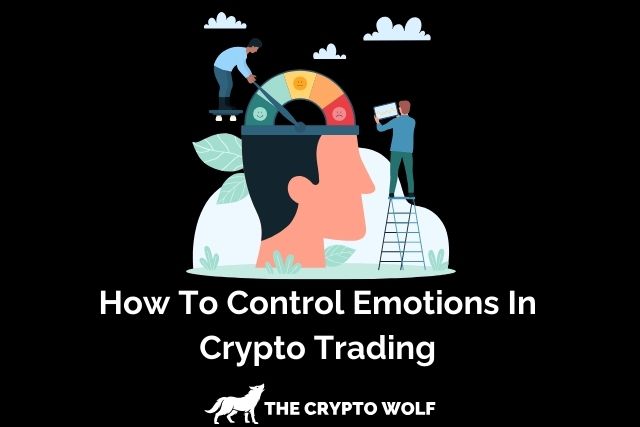Learning how to control emotions in crypto trading is the most difficult aspect because it requires constant self-discipline and the ability to remain calm and rational amidst unpredictable market movements.
Although I have been a crypto trader for over seven years, I still struggle with controlling my emotions to date.
You have to realize that keeping your emotions in check is essential for achieving long-term success.
Trading is one of the most difficult careers in the world because it demands not only extensive market knowledge and analytical skills,
But also the ability to manage intense stress, control emotions, and maintain discipline.
In this article, I will share a few tips to control your emotions and become profitable in trading.
If you’re ready, let’s dive in
How To Control Emotions In Crypto Trading
1. Create A Trading Plan

Having a trading plan and being committed to obeying it will help you control your emotions.
If your trading plan has defined rules that must be obeyed irrespective of how you feel it would help keep your emotions in check.
A well-thought-out trading plan acts as a roadmap, guiding your decisions and reducing the influence of emotions.
Your plan should include clear entry and exit strategies, risk management rules, and specific goals.
By sticking to your plan, you can make decisions based on logic and analysis rather than impulsive reactions.
For years, I didn’t bother to create a trading plan because I thought I didn’t need it. I was wrong and it was the reason I wasn’t profitable in my first three years of trading.
2. Practice Risk Management
Risk management is the key to profitable crypto trading.
If you can’t manage your risks, you will never be successful.
One of the things I always tell other traders is that “trading is 10% skill and 90% risk management.”
In case you haven’t realized, trading is a guessing game and the goal is to guess while risking a small portion of your capital to find out if you’re right or wrong.
The key issues to keep in mind regarding risk management are as follows:
3. Always Set Stop Loss
I can’t stress this enough: never open a trade position without using stop loss.
In Fact, it’s one of my important trading rules.
As a rule of thumb, you should set stop loss when you open a position.
Some traders make the mistake of not setting a stop-loss immediately; they prefer to monitor the trade and close it when it gets to the stop-loss they have in mind.
The problem with that approach is that you could be tempted not to close the trade because you’re expecting the market to reverse in your favor.
This can lead to significant losses if the market continues to move against you.
By setting a stop loss when you open a position, you ensure that your losses are limited and your emotions do not interfere with your trading decisions.
4. Set Realistic Goals
Some traders set unrealistic goals.
It’s common to find traders who want to make $1000 daily using a capital of $100.
Having unrealistic goals can make you take unnecessary risks because you’re trying to meet your goal.
Some traders expect 100% profit for each trade, which is not always possible.
You sometimes have to be willing to take what the market offers you.
When your expectation is unrealistic you would likely feel bad when you don’t achieve it.
Having a negative self-image about yourself would certainly affect your trades, which can make you blow your account.
5. Avoid High Leverage
Most futures traders often use high leverage that causes their position to get liquidated easily.
The crypto market is very volatile. The more leverage you use, the higher your chances of liquidation.
In most of my futures trade my maximum leverage is 5X.
6. Keep A Trading Journal
A lot of traders often ignore journaling because they think it’s not important.
Honestly, I was like that until I started documenting my trades, and my trading mistakes became obvious.
Journaling helps you to identify your mistakes and improve your strategies over time.
By keeping a detailed record of each trade, including your reasoning, emotions, and outcomes, you gain valuable insights that can lead to more disciplined and profitable trading decisions.
7. Work On Your Patience
Patience is one of the greatest virtues of a trader.
If you can’t be patient, you will miss out on very profitable trades, and you will enter trades too early, which would significantly increase your risk.
Without patience, you enter trades at high prices, which would make it difficult to make a profit.
When you have the pressing urge to enter into a trade, delay it for some time or, better still, set a limit order based on support and resistance zones.
8. Take A Break From Trading
You can take a break from trading for a while if you notice you’re becoming too emotional.
Taking a break from your trading screen for a couple of days would help you re-evaluate your trading process and highlight the reasons for your mistakes.
Trading can be exhausting, especially if you’ve been on a losing streak.
Taking a break can prevent burnout and help you return with a clear and rational mindset.
9. Focus On Education

The more knowledge you have the more likely you would become a more disciplined trader.
I recommend you get the following books because it changed my life
Trading in the zone by Mark Douglas
The disciplined trader by mark Douglas
The mental game of trading by Jared Tendler
The new trading for a living by Alexander Elder
Thinking fast and slow by Daniel Kahneman
Another form of education is learning from your mistakes, analyzing what went wrong in your previous trades and developing guidelines to avoid a repeat of such situations.
10. Understand Your Emotional Triggers
You have to find out what causes you to be emotional in your trading.
Emotions in trading, such as fear, greed, and impatience, are often triggered by specific situations. Fear arises from past losses, sudden market swings, and high leverage.
Greed is driven by overconfidence from recent wins, holding trades too long to maximize profits, and ignoring trading plans.
Impatience comes from wanting quick results, boredom during waiting periods, and unrealistic return expectations.
Understanding these triggers can help you manage your emotions and make better trading decisions.
11. Join A Trading Community

Joining a trading community might help you put your emotions in check.
The more you interact with other experienced traders, the better you become at managing your emotions.
Most professional traders have learned emotional discipline to a certain degree, and they can easily share their tips with you.
You can find crypto trading communities on Facebook, Reddit and Telegram.
Frequently Asked Questions
How Do You Control Emotions In Trading To Avoid FOMO?
Stick to your trading plan and predefined strategies. Focus on long-term goals and avoid impulsive decisions by practicing patience and discipline.
How Do I Stop Overthinking In Trading?
Simplify your trading strategy and trust your analysis. Set clear entry and exit points, and avoid second-guessing by sticking to your plan.
How Do I Overcome My Fear And Anxiety In Trading?
Use risk management techniques, such as setting stop-loss orders, to limit potential losses. Start with smaller trades to build confidence and gradually increase your exposure as you gain experience.
